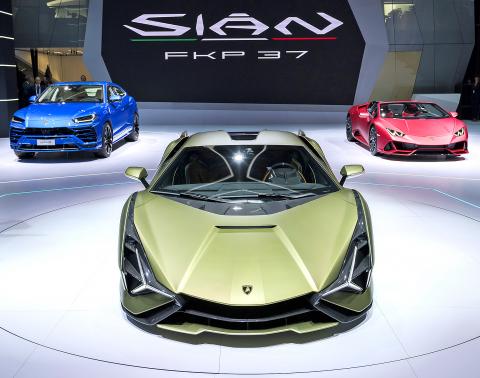Volkswagen AG’s (VW) plan to review options for its Lamborghini supercar division marks a further step in chief executive officer Herbert Diess’ campaign to transform the world’s biggest automaker and more than double its market value.
The German automaker is weighing a potential sale or stock listing for the Italian brand, according to people familiar with the matter, as Diess channels resources to the main VW, Porsche and Audi units.
No decision has been made and a plan to move Lamborghini from under the Audi umbrella to Porsche remains an option, they said.

Photo: AP
Volkswagen has started preparations to fold Lamborghini into a separate legal entity and the process might conclude toward the end of next year, the people said, asking not to be identified because the deliberations are confidential.
VW on Sunday signaled that any decision is likely a ways off, saying it has no plans for a Lamborghini sale or initial public offering (IPO).
Diess, 60, has been pushing an overhaul of Volkswagen since he became chief executive officer 18 months ago — investing billions in electrification, selling a stake in truckmaker Traton SE, and putting industrial-transmission and diesel-engine units up for sale.
He has also forged an alliance with Ford Motor Co to share the costs of developing commercial vans, electric vehicles and autonomous driving.
“We shouldn’t spread ourselves too thin,” Diess said in an interview published over the weekend in Germany’s Sueddeutsche Zeitung newspaper. “That might be hard in some cases, but it’s the only viable way.”
Analysts have urged VW to consider deep changes, including an IPO of Porsche, to unlock value.
The sports-car unit is VW Group’s most profitable division, while Audi contributes the biggest share of earnings.
A higher valuation would let Diess use VW’s stock as currency for partnerships and consolidation opportunities.
Despite robust operating results, VW shares are down by more than one-third from highs set before the 2015 diesel-cheating crisis. VW’s market value is about 81 billion euros (US$89.34 billion).
Progress in restructuring has been hampered by convoluted governance at Volkswagen. Unions, politicians and the powerful Porsche-Piech ownership clan each have a say in big decisions.
An asset review that began in 2016 has so far led to an aborted attempt to sell the Ducati motorcycle brand and the ill-timed Traton IPO, which was almost derailed by internal wrangling.

DIVIDED VIEWS: Although the Fed agreed on holding rates steady, some officials see no rate cuts for this year, while 10 policymakers foresee two or more cuts There are a lot of unknowns about the outlook for the economy and interest rates, but US Federal Reserve Chair Jerome Powell signaled at least one thing seems certain: Higher prices are coming. Fed policymakers voted unanimously to hold interest rates steady at a range of 4.25 percent to 4.50 percent for a fourth straight meeting on Wednesday, as they await clarity on whether tariffs would leave a one-time or more lasting mark on inflation. Powell said it is still unclear how much of the bill would fall on the shoulders of consumers, but he expects to learn more about tariffs

NOT JUSTIFIED: The bank’s governor said there would only be a rate cut if inflation falls below 1.5% and economic conditions deteriorate, which have not been detected The central bank yesterday kept its key interest rates unchanged for a fifth consecutive quarter, aligning with market expectations, while slightly lowering its inflation outlook amid signs of cooling price pressures. The move came after the US Federal Reserve held rates steady overnight, despite pressure from US President Donald Trump to cut borrowing costs. Central bank board members unanimously voted to maintain the discount rate at 2 percent, the secured loan rate at 2.375 percent and the overnight lending rate at 4.25 percent. “We consider the policy decision appropriate, although it suggests tightening leaning after factoring in slackening inflation and stable GDP growth,”

Meta Platforms Inc offered US$100 million bonuses to OpenAI employees in an unsuccessful bid to poach the ChatGPT maker’s talent and strengthen its own generative artificial intelligence (AI) teams, OpenAI CEO Sam Altman has said. Facebook’s parent company — a competitor of OpenAI — also offered “giant” annual salaries exceeding US$100 million to OpenAI staffers, Altman said in an interview on the Uncapped with Jack Altman podcast released on Tuesday. “It is crazy,” Sam Altman told his brother Jack in the interview. “I’m really happy that at least so far none of our best people have decided to take them

As they zigzagged from one machine to another in the searing African sun, the workers were covered in black soot. However, the charcoal they were making is known as “green,” and backers hope it can save impoverished Chad from rampant deforestation. Chad, a vast, landlocked country of 19 million people perched at the crossroads of north and central Africa, is steadily turning to desert. It has lost more than 90 percent of its forest cover since the 1970s, hit by climate change and overexploitation of trees for household uses such as cooking, officials say. “Green charcoal” aims to protect what